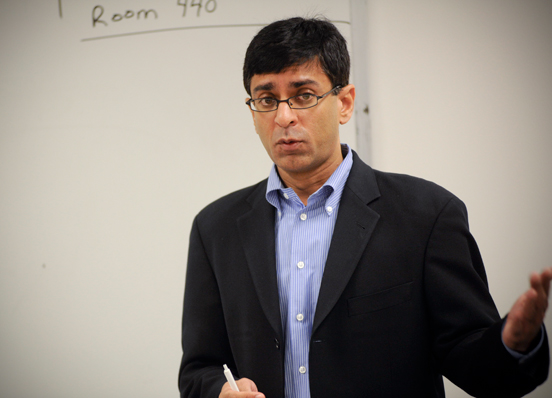
Although President Donald Trump’s executive order that banned most visitors from Iraq, Syria, Iran, Sudan, Libya, Somalia and Yemen from entering the U.S. has been restrained by the Ninth Circuit Court of Appeals, arguments as to the merits and legality of this executive order are ongoing.
Trump has been using his executive order on strengthening border security to expand the powers of immigration authorities. The title of this executive order is “Border Security and Immigration Enforcement Improvements.”
Included in this executive order are several provisions regarding securing the southern border by a physical wall and monitoring by active personnel. Additionally, this executive order forces states to comply with federal immigration laws to detain and remove individuals who are suspected of violating these laws. But it’s not that simple.
“There are legal limits, under both domestic law and international law,” Anil Kalhan, a professor at the Kline School of Law, said.
Kalhan sat down with The Triangle Feb. 21 to discuss the legal implications surrounding President Donald Trump’s executive order regarding banned travel from seven countries.
Kalhan said that the U.S. has the authority to limit who comes into the country, but not without restrictions.
Additionally, irrespective of the executive order itself, the President has great executive power over immigration. Even if travel is not banned from these seven countries outright, since the ban has been halted, the president can implement policies like extreme vetting of incoming travelers. Trump can also simply reduce the number of refugees admitted into the country.
“There are lots of things that are legal to do that are terrible ideas,” Kalhan said.
Kalhan also said that there would be many obstacles to building a wall between the U.S. and Mexico.
“A lot of property where a wall would be built is owned by private property owners and large stretch of land along the border in Arizona is owned by a Native American tribe,” Kalhan said. “It is practically and legally difficult to carry out this promise.”
Kalhan sees a legal problem with implementing Trump’s immigration policies within the confines of both domestic and international law. Additionally, Kalhan has concerns with the implementation of this executive order to expedite the deportation of illegal immigrants.
“Looking at the executive order and the memos that would implement them, the Trump Administration wants to start deporting people without recourse to hearings, which would be a massive set of due process violations, such as not giving them hearings in front of an immigration judge,” Kalhan said.
Kalhan also cannot foresee, even putting aside due process, the orderly implementation of this executive order.
“They are going to enforce immigration law in a highly chaotic way such as giving every front line officer the power to decide for themselves who should be deported, or they will do what the Obama administration did and focus on certain groups to deport,” Kalhan said.
The enforcement of this executive order also increases federal power with regards to legal enforcement of immigration.
“States don’t have inherent authority over immigration,” Kalhan said. “A few years ago when Arizona tried, the Supreme Court pushed them back that their law was preemptive.”
And sanctuary cities, cities that will not hold an individual for longer than the city itself has interest in them, no matter how the federal government feels about this individual, have pushed back on this notion.
“Sanctuary cities aren’t a legal term, rather it is the cities saying that they will not act as immigration agents unless they have independent reason to do so,” Kalhan said.

